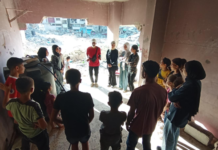Fayha’ Shalash
The Electronic Intifada / July 12, 2024
When Usaid Jabarin gave kisses to his five children as they left for school on 21 May, he did not know it was the last time they would see him alive.
Usaid was a surgeon at Jenin Governmental Hospital in the occupied West Bank. His journey to work that morning took place amid an Israeli military raid on the area.
Arriving at the hospital, Usaid got out of his car and began walking toward the hospital. He had only walked a few steps when he was shot and killed by a sniper.
“He loved doing good for people and was always smiling,” Kamel, Usaid’s uncle, said. “He did not act like a doctor but as a friend with all his patients.”
During the same Israeli military raid, the paramedic Hazem Masarwa was trying to reach injured people when he encountered gunfire.
Masarwa got out of the ambulance and lay down next to it. When he was able to check the ambulance, he found that there was broken glass all around it and that “it had been perforated by more than 10 bullets,” he said.
It was not the first time that Masarwa found himself in extreme danger as he worked.
A few months ago he was taking a wounded person to hospital during another Israeli military raid of Jenin. Suddenly, his ambulance came under attack by Israeli soldiers.
The soldiers pointed their weapons at him, making him stop the ambulance.
“They threatened to shoot me, took me out of the vehicle and forced me to open the back door,” he said. “Then they checked the identity of the injured person, arrested him even though he was bleeding and fired into the air to force me to leave the place.”
On 12 December, Fouad Abahra was shot by Israeli forces in the center of Jenin.
Masarwa was one of the paramedics who came to Abahra’s aid and placed him in an ambulance.
“We were trying to reach the hospital as quickly as possible because the injured person suffered from serious wounds in the thigh and severe bleeding,” Masarwa said. “But the soldiers stopped us and prevented us from reaching the hospital under the pretext that they wanted to check his ID, which he did not have.”
Although others in the ambulance provided the soldiers with Abahra’s full name and his age, the soldiers blocked them for more than 10 minutes. The ambulance was then unable to stop at the nearby Jenin Governmental Hospital as it was surrounded by Israeli troops.
Abahra was brought to a different hospital but he was already dead by the time the ambulance arrived there.
“I will never forget that day as long as I live,” Masarwa said.
There was considerable coverage in January this year when Israeli forces – disguised as medical staff and civilians – entered Ibn Sina hospital in Jenin. The Israelis shot dead three patients, one of whom was partially paralyzed.
Many other attacks on the West Bank’s healthcare system go unnoticed by the international press.
Fayha’ Shalash is a journalist based in the occupied West Bank












